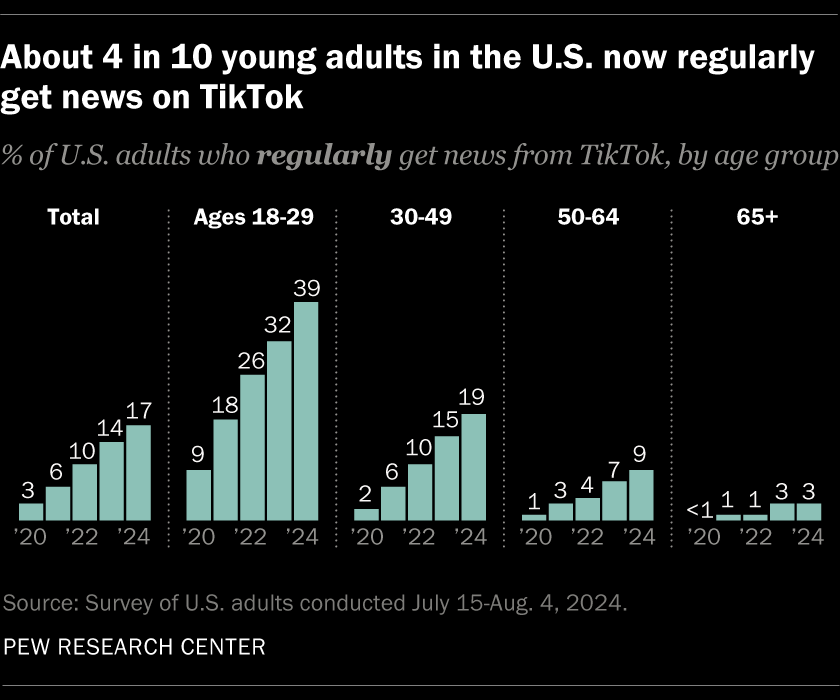On Tuesday, I hosted a discussion for DiEMTV on what Trump’s second term could mean with Yanis Varoufakis and US political commentator Katie Halper
The entire conversation (above) is worth your time, but later in the show we got into what activists can do to resist Trump’s agenda, and lessons from his first term. Since the ‘how’ of effective activism is particularly close to my heart, I’ve isolated the most salient parts below.
Katie, with her sharp political insight and huge following, offered actionable advice on being strategic, using social media effectively, crafting better messaging, and more.
If you’re in Europe and think the U.S. is an exception and that these ideas might not apply to you, think again. What happens there often sets the stage for what’s next here. And while the contexts differ, the strategies we discussed can be applied everywhere.
I hope you’ll enjoy this as much as I did.
Cheers
Mehran
TikTok and social media strategy

TikTok has become a critical platform for spreading subversive ideas. But it’s under threat. We discussed why it’s being targeted and what activists can do to prepare for a future without it.
MEHRAN: Biden pushed to ban TikTok, and now Trump has delayed the ban for 90 days. A large part of the reason seems to be because of the pro-Palestine and anti-imperialist content there. What do you think?
KATIE: This speaks to Trump’s opportunism. Because Biden succeeded where Trump failed. Trump tried banning TikTok in 2020, citing the same concerns that Biden did: data being stolen by the evil Chinese Communist Party. And the Supreme Court rejected it. Now it’s approved Biden’s attempt to do that.
And so because [Trump] is an opportunist, he’s now saving TikTok, the thing he tried to shut down, because it’ll give him a win and because it’s so popular and young people will love it.
On why people like Biden and Trump want to shut [TikTok] down: [former presidential candidate] Mitt Romney [cited] “the number of mentions of Palestinians relative to other social media sites” on Tiktok. [Senator] Josh Hawley talk about the anti-Semitism problem on TikTok. I think it’s both reasons: competition with China, and censoring those views.
Many think there’s no suppression on TikTok, that it’s this inherently pro-Palestine platform. The truth is, there is suppression even there. But when you have people of a certain age who haven’t been indoctrinated by zionism, it’s logical that they’ll be interested in Palestine content, that’s honest and that doesn’t perpetuate Hasbara [pro-Israel PR].
MEHRAN: TikTok is a powerful tool to spread the word. The percentage of Gen Z in the US getting their news from TikTok is enormous [25%]. Do you think the ban is going to stick? And that [US activists] might be deprived of this outlet to advocate for their views?
KATIE: I honestly don’t know. But we have to be skeptical of all platforms.
I know people will get demonetised from YouTube. Sometimes I’m scared I will. It’s smart to be on many venues, many platforms, TikTok, Instagram. To cover all your bases. The problem is, all these platforms are beholden to the same oligarchs we see attending Trump’s inauguration.
MEHRAN: And own your email list. So at least you’re not building a castle in the sand.
KATIE: Right. It’s scary, because there’s no transparency with any of these platforms. If you get banned, if you get removed, there’s no way to appeal it except to kiss the ring. Or hope that you have a following that’s big enough [to pressure the platforms].
Strategic activism: Avoiding the Musk trap
But social media isn’t the only arena —what about the cultural traps we often fall into? Activists made major mistakes during Trump’s first term by focusing on outrage instead of strategy. We explored what needs to change this time, using Elon Musk’s controversial salute as an example.
MEHRAN: I’ve been following conversations with leading organisers in the US, and there’s been a lot of self-criticism recently [about their work during Trump’s first term] which I have not seen before. For example from Kelly Hayes, a well known organiser.
She and many others call for a more strategic activism, one that doesn’t rely on getting everyone to the streets and crying ‘nazism’ and ‘fascism’ all the time. A more patient and targeted activism.
But then, take Elon Musk’s salute [he was filmed at the inauguration making what some interpreted as a Nazi salute, sparking outrage on social media]. It was an important cultural moment. The reaction from the left, and from the legacy media, made me disappointed.
Because if Musk didn’t mean it, if he was just making big hand gestures, it wasn’t worth commenting on. And if he did mean it, well, he’s not a Nazi. He would have been doing it to ‘own the libs’ and be provocative. So why would anyone fall into his trap by letting it produce such outrage?
Is that [outrage] really what opposition to Trump is going to look like? Haven’t we learned anything from the derangement that we saw from the past?
KATIE: You do have to be more strategic, and I hear what you’re saying, on the over-vilification of Trump.
You don’t need to hyperbolise. You don’t have to say “this is the end of democracy”. You can just talk about all the terrible things [Trump] is doing. The tax cuts. Reproductive rights. That he just reinstated the death penalty. The climate stuff. There’s enough stuff to criticise him for. It’s the same with Elon Musk.
But this [Musk’s salute] is one of the cases where I understand if people are bothered by it. In other words, it’s not the best example of the [Trump derangement] phenomenon.
The challenge with Trump is how to walk that line between his being both an aberration and not an aberration. Where he’s an aberration, you have to specify and where he’s not, we have to specify.
MEHRAN: Yeah. You’ve mentioned focusing more on policy, and the executive orders that Trump just signed. A strategic response for activists could be look at the impact of all those executive orders and figure out how one could resist.
But that’s not very sexy. It’s much sexier to shout “Musk did a Nazi salute!”
Coalition building vs Demonising voters
Winning numbers, not just arguments, is key to defeating Trump. Katie explained why demonising Trump voters is a mistake. This is a vital point that’s also very relevant for Europe: for example re AfD voters in Germany, FN in France, or Reform in the UK.
KATIE: Another mistake is to write off all people who voted for Trump as irredeemable, racist bigots. First, I don’t think that’s true. But let’s say it is. Well, if you’re trying to win electoral politics, you have to win numbers.
Liberals have an entitled idea that they deserve your vote. [And] that they never fail — they are only failed.
So you can either have these people who you find despicable voting for Trump, or not voting for Trump. Liberals have an entitled [idea] that they deserve your [vote]. That Democrats never fail, they are only failed. We saw this with Hillary [Clinton]. [They] don’t have any empathy for people who are in pain and vote for Trump for that reason.
If you want to call all Trump supporters bigots and racist, you still have to get their votes. If you care about defeating Trump.
MEHRAN: Exactly. You’ve got to grow your coalition rather than just speak to the converted.
KATIE: Yes, and we do have to grow a bigger coalition. As Martin Luther King said, “If you’re comfortable in your coalition, it’s not big enough.”
MEHRAN: Right. Are there any other lessons that you have drawn from Trump’s first term that activists could apply now to resist his agenda more effectively?
KATIE: Something that Aaron Maté, my co-host at Useful Idiots has pointed out, is to be strategic about your resistance. At first, people were showing up at the airports to protest the Muslim ban. And then that got converted into performative, hysterical and alienating Russiagate stuff.
We should be appealing to everyone, including Trump voters. Not everyone is convertible, but we do need to be appealing to people who don’t already hate Trump.
That doesn’t mean you throw anyone under the bus. But the strongest anti-Trump arguments are [those] that will appeal to people across the board, and not just people who liberal sensibilities. That’s the problem with the way Democrats do it. Like [the slogan] “Love Trumps hate.” Good luck with that — that’s a nice porch sign. It means absolutely nothing.
From the decline of identity politics to organising around class
Identity politics has divided the left and given the right an easy target. Katie and I discussed whether its decline could create space for a more unified, class-focused left.
KATIE: We have to be organising around class and anti-war sentiment . A lot of people will say ‘you can’t organise around class because people are racist’. I’m like, no: that’s one of the major reasons you have to organise around class because that competes with people’s racism. If you want people to identify around something and they’re identifying around race, what better way to say ‘you want to protect your own interests? Well, here’s an interest that connects you with people who share your interest on a real level.’ Not a superficial, eugenics level.
If you care about racism, you would care about economic justice too. Because of the way those two things interact with each other.
When you turn to class, you’re fighting against racism. Hillary Clinton said, “Is breaking up the banks gonna end racism?”. The answer is No. But at the same time, yeah, breaking up the banks would have had implications because of how racialised the housing crisis was.
MEHRAN: I think that there is a general consensus that identity politics [wokeism] is on the wane. It predated Trump, but Trump accelerated it. And now it has lost its institutional support. Facebook recently announced the end of its content moderation policies; Musk bought Twitter. A lot of these things are changing.
Would you agree with this vibe shift? Could there be a space for a new left that’s more focused on material gains, rather than who people are?
KATIE: It doesn’t have to be either/or. Sometimes people are like “we shouldn’t be talking about trans stuff. So we’re going to spend a lot of time talking about why we shouldn’t be talking about trans stuff.” I don’t think that’s the solution either. Or going after DEI [Diversity, equity, inclusion policies] or affirmative action. That’s an overcorrection; it should not be the priority.
It’s not well placed and it’s a distraction. The problem with identity politics is the weaponisation of identity politics.
We need to focus on the things that connect the most people. And that is class. And it’s not always even class stuff. Like with healthcare: a lot of people who aren’t working class will lose all their money if they have a healthcare crisis.
People are realising that no, caring about class does not make you a homophobic, racist, transphobic, misogynist.
This article was first published on the Subvrt activism newsletter
Do you want to be informed of DiEM25's actions? Sign up here















